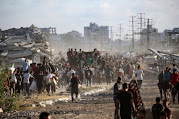Growing amicable relations between Iran and Saudi Arabia
have played a significant role in promoting peace and security in West Asia
over the past years. Such cordial ties have come into even sharper focus
following Israel’s aggression against Iran last month.
On June 13, Israel launched unprovoked strikes on Iranian
territory, targeting high-ranking military commanders, nuclear scientists, and
civilians alike. The United States later joined the Israeli war effort,
launching attacks on three of Iran’s nuclear facilities—actions widely viewed
as violations of the United Nations Charter and the Non-Proliferation Treaty.
In a swift and powerful response, Iranian Armed Forces
launched retaliatory strikes on strategic Israeli targets in cities such as Tel
Aviv and Haifa, and struck the al-Udeid air base in Qatar—the largest American
military installation in West Asia.
By June
24, Iran’s coordinated operations had effectively brought Israeli and American
aggression to a halt.
The scale and precision of Iran’s missile power shocked
Israel and its Western allies, particularly the United States.
“Although Israel has its own sophisticated,
multilayered defense, which includes systems like Arrow, David’s Sling and Iron
Dome, the country was running low on its own interceptors and was husbanding
resources by the time the conflict ended.
Had
Iran fired a few more large volleys of missiles, Israel could have exhausted
its supply of top-tier Arrow 3 munitions,” The Wall Street Journal reported on
Friday, citing American officials familiar with the 12-day war.
The Journal also revealed that despite deploying two
advanced THAAD missile-defense systems to Israel in the wake of the conflict,
the US efforts proved insufficient to fully stop Iran’s missile barrages.
“Operating alongside Israeli systems, THAAD operators burned
through munitions at a furious clip, firing more than 150 missiles to shoot
down the waves of Iranian ballistic missiles,” the paper reported.
The
intensity of the Iranian attacks created such a high demand for interceptors
that, according to the Journal, the Pentagon considered diverting THAAD
interceptors already purchased by Saudi Arabia to Israel. “Saudi Arabia refused
US request to send interceptors to Israel”
Meanwhile, according to Middle East Eye, which cited two
American officials, the US asked Saudi Arabia to turn over THAAD interceptors
to help Israel, but Riyadh rejected the request. “Saudi Arabia's refusal
to help Israel will sting officials in Washington,” MEE added.
Saudi
Arabia’s “no” to the US demand underscores the deepening ties with Iran.
On July 8, Saudi Crown Prince Mohammed bin Salman (MBS) held
talks with Iranian Foreign Minister Abbas Araghchi in Jeddah. In the meeting,
the Saudi crown prince condemned any military aggression against Iran’s
sovereignty and territorial integrity. He welcomed the improving climate of
cooperation between the two Islamic powers.
Araghchi, in turn, “thanked Saudi Arabia for its responsible
stance in condemning the Israeli aggression against Iran.”
He put emphasis on Iran’s commitment to building stronger
ties with its neighbors, including Saudi Arabia based on principles of good
neighborliness and mutual interest.
Araghchi also held talks with Saudi Defense Minister Prince
Khalid bin Salman and Foreign Minister Prince Faisal bin Farhan, reaffirming
the countries’ commitment to closer strategic cooperation.
China’s
mediation drives Iran-Saudi unity for regional stability
The renewed diplomatic warmth is rooted in a 2023 agreement
brokered by China, which saw Iran and Saudi Arabia formally restore ties after
years of estrangement. Since then, China's constructive mediation has played a
key role in bringing Tehran and Riyadh closer together.
As the dust settles on the most intense Israel-Iran war in
recent memory, the strengthening bond between Iran and Saudi Arabia emerges as
a powerful force for stability in West Asia. Their growing diplomatic,
political, and economic cooperation is not only reshaping the region's
strategic landscape—but also offering a compelling alternative to the cycles of
escalation driven by Israeli aggression.
Once
geopolitical rivals, Tehran and Riyadh now appear poised to lead a new era—one
rooted in sovereignty, mutual respect, and collective security. Their united
front sends a clear message: regional peace is best preserved not through
foreign intervention or militarism, but through regional unity and shared
interests.
In a time of increasing volatility, Iran and Saudi Arabia
are demonstrating that Islamic nations can rise above division and become
pillars of stability—capable of defending their people, upholding international
law, and resisting those who threaten the peace of the region. The path they
have chosen may well define the future of West Asia.






















